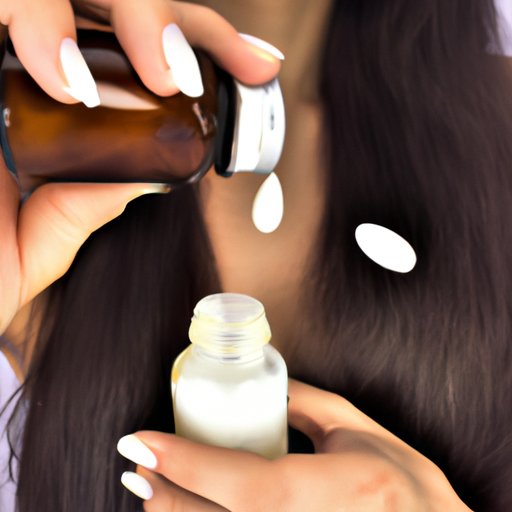
I. Introduction
Hair loss or thinning can be distressing for anyone. Whether it’s a result of genetics, aging, stress, or poor hair care, finding ways to stimulate hair growth can help you get back your confidence. In this article, we’ll cover natural remedies, supplements, hair treatments, and lifestyle habits that can promote hair growth and thickness.
II. 7 Natural Ways to Stimulate Hair Growth
Natural remedies can boost hair growth by nourishing hair follicles, increasing blood circulation, and reducing inflammation. Essential oils like lavender, rosemary, and peppermint, help to stimulate circulation and unblock hair follicles. Scalp massages help to increase blood circulation and promote relaxation. A balanced diet rich in protein, vitamins, and minerals such as iron, zinc, and biotin, ensure the body has all the nutrients it needs to grow hair.
III. The Power of Supplements: Boosting Hair Growth from Within
Supplements can give the body the nutrients it needs to grow healthy hair. Biotin, Vitamin D, iron, and Zinc supplements are known for their powerful hair growth benefits. Biotin strengthens hair and improves hair texture, while iron prevents hair loss and enhances growth. Vitamin D and zinc work together to stimulate hair follicles and improve hair growth. Before taking supplements, consult your doctor to discuss the right dosage and check for any possible side-effects.
IV. Hair Growth Treatments: A Comprehensive Guide
Over-the-counter hair growth products contain ingredients like minoxidil and finasteride, which stimulate hair growth by reducing DHT levels and improving circulation. PRP therapy, a popular hair restoration treatment, uses platelet-rich plasma from your blood to stimulate hair growth. Hair transplants involve transferring hair follicles from one part of the scalp to another, while scalp micropigmentation uses cosmetic tattoos to create the illusion of fuller hair. Consider consulting a hair growth specialist to discuss the best treatment option for you.
V. Lifestyle Changes for Fuller, Healthier Hair
Lifestyle factors such as stress and exercise can also affect hair growth. Too much stress can cause hair loss, so finding ways to manage stress, such as meditation, yoga, or massages, can help. Exercise improves blood circulation and reduces inflammation, which are both essential for healthy hair growth. Proper hair care routines, such as avoiding harsh chemicals and heat styling, and using a soft-bristled brush and a silk pillowcase, can prevent hair damage and breakage.
VI. The Dos and Don’ts of Hair Growth
Common mistakes that can impede hair growth include overwashing, using hot water, rough towel drying, and using the wrong hair products. Avoid overwashing hair as it strips away natural oils that protect hair follicles. Use lukewarm water and a gentle shampoo instead of hot water and harsh chemicals. Be gentle when drying hair with a towel, and avoid using heat styling tools whenever possible.
VII. Hair Growth Myths Debunked
Some common hair growth myths are not true. For instance, frequent hair cuts do not stimulate hair growth. Hair grows from the roots, so trimming the ends will only make it look healthier. Cutting hair does not stimulate the root to grow. Wearing a hat does not cause hair loss, nor does washing hair too often. In fact, wearing a hat can protect hair from sun damage and washing it regularly can remove dirt and excess oil that can clog hair follicles.
VIII. The Science of Hair Growth: How It Works and What You Can Do to Promote It
Hair growth is a complex biological process that involves different stages of growth and rest. The hair follicle is the part of the scalp that is responsible for hair growth. The growth stage, called anagen, lasts for 2-6 years and is followed by the rest stage, called telogen, which lasts for 2-3 months. Genetic and environmental factors like hormones, stress, and diet can affect hair growth. Following hair growth tips like eating a balanced diet, reducing stress, and using the right hair care products can improve hair growth.
IX. Conclusion
There are many natural ways to stimulate hair growth and promote hair health. With the right supplements, treatments, and lifestyle changes, you can achieve fuller, healthier hair. Be patient and experiment with different methods to find what works best for you. If you suffer from severe hair loss or other conditions, consider consulting a hair growth specialist. Remember, taking care of your hair is a journey, not a destination.




